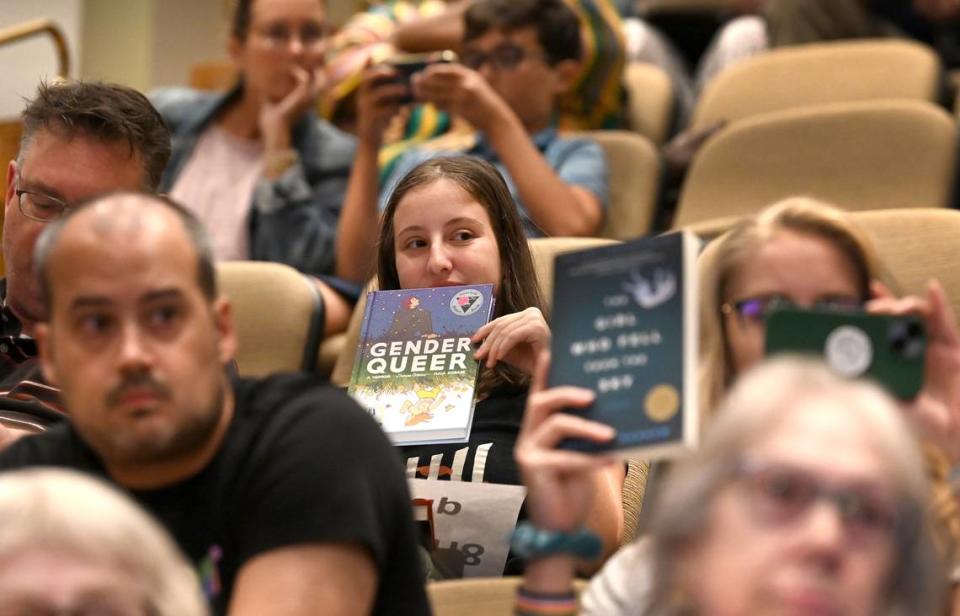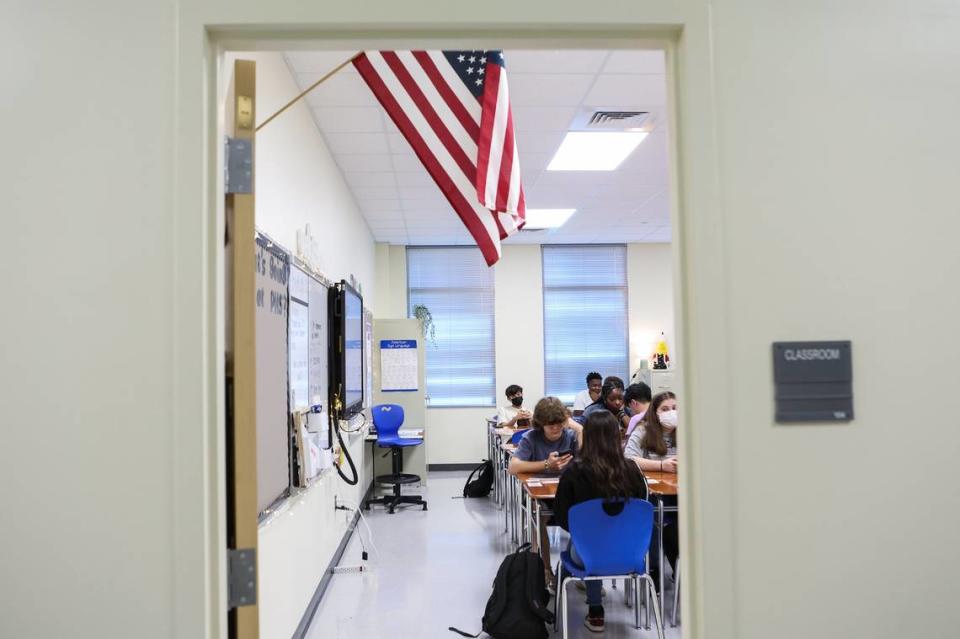What internal CMS emails reveal about NC Parents Bill of Rights implementation
Charlotte-Mecklenburg Schools acted fast to implement the Parents’ Bill of Rights, but internal emails reveal many teachers and administrators remained uncertain about how to do so.
The law passed last year prohibits “instruction on gender identity, sexual activity or sexuality” in kindergarten through fourth grade, including in textbooks and “other supplementary materials.” School districts across the state have worked to implement the measure critics say is an excuse to remove content with LGBTQ representation and discriminate against LGBTQ students, while supporters say it protects children from sexual material. The law does not define what constitutes “gender identity, sexual activity or sexuality” instruction.
The records show teachers and administrators were confused about whether to remove books or classroom materials but often leaned toward removal of anything politicians might consider controversial.
CMS was one of the first districts in the state, if not the first, to amend its policies to align with Senate Bill 49 on Aug. 22, despite disagreement among board members.
“To the CMS students who will experience harm or risk danger under these regressive laws, I want you to know that there are many in this community who support your authentic lives,” board member Melissa Easley said at the Aug. 22 school board meeting. Easley herself identifies as bisexual, and her spouse identifies as gender fluid.

American Oversight, a nonprofit public records watchdog, requested and received 1,029 pages of emails and attachments between CMS officials and educators from early this school year that had to do with implementing SB 49. It provided the records to The Charlotte Observer.
The correspondence shows abiding by the law was a heavy lift for district employees over a short period of time, and the vagueness of the bill left many educators confused about what materials were permitted.
What was in Parents Bill of Rights emails?
The Republican-crafted bill passed both chambers of the North Carolina General Assembly largely along party lines, with the only Republican ”no” vote coming from Rep. Hugh Blackwell of Burke County. Gov. Roy Cooper vetoed Senate Bill 49 on July 5, saying legislators were “burdening schools with their political culture wars.” However, the General Assembly later overrode the governor’s veto.
In addition to restricting curriculum for certain age groups, the law requires parental consent for sex ed programming and health screenings as well as for teachers to notify parents if their child requests to go by a different name or pronouns in school.
Messages from district officials, teachers, parents and librarians about SB 49 were among the emails the Observer reviewed. CMS acknowledged a request for comment last week, but did not respond with answers to questions from the Observer.
Jaron Carson, CMS chief equity and school performance officer, and Nancy Brightwell, CMS chief academic officer, told elementary school principals to ask teachers to review their classroom libraries for compliance with the law in an email sent Aug. 28, six days after the district adopted new policies aligning with SB 49.
“Principals should advise teachers to remove any books from classroom libraries that have content related to gender identity, sexual activity or sexuality that students may access as part of independent reading tasks,” the message said.
Carson and Brightwell did not further define what kind of content falls into these categories, and several educators asked for guidance about specific books later.
Kimberly Ray, CMS director of digital learning and library services, handled the bulk of educators’ questions and told one teacher in a Sept. 28 email she screened books for “alternative use of pronouns, same-sex couples, etc.”
Title IX instructional materials were flagged for “potential LGBTQ interpretation.” These included stories called “Odd velvet” and “Red: A crayon’s story” as well as a video described as “standing up to a bully/harassment/bullying activity” that was produced by Sesame Street. The review also flagged some PowerPoint slides showing two women holding hands or hugging, a slide that says, “girls can harass girls” and “boys can harass boys” as well as a resource page that included an organization that helps LGBTQ youth.
“Red: A crayon’s story,” which was originally intended for use as part of the CMS kindergarten Title IX curriculum, according to documents obtained in the records request. Some parents complained to CMS the book depicts a metaphor for transgender identity. Other parents told the Observer it is simply about what it’s like to feel like you don’t fit in — inspired by the author’s experience growing up with dyslexia. While the book was still available in 38 CMS elementary school libraries as of October, it was removed from the Title IX curriculum for kindergarten. Emails revealed the district is developing another lesson plan for next year.
Meanwhile, the emails suggest many current kindergartners did not receive a Title IX lesson this year after “Red” was removed from curriculum.
Books and a PowerPoint presentation

The district later removed “The Little Library,” a picture book about a child’s woodworking project to create a little free library, from a second-grade lesson plan. A Polo Ridge Elementary teacher emailed several district employees asking whether she could continue to teach with it after reading it to several classes and realizing the text refers to a librarian named Beck Goode using the gender-neutral pronoun “they.”
“I did not even notice this when reading the book prior to the lesson and didn’t pick up on it until the third reading,” she wrote. “It was never a discussion point in class, and I received no questions about it.”
After reviewing the story, Ray directed her not to teach with the book.
“This book does use the pronoun ‘they’ for the librarian, so it should not be used in instruction,” Ray wrote. “It is very subtle but with everything going on…”
Just because books are removed from lesson plans or classrooms does not mean they are removed from school libraries. For example, while “Red” cannot be used in lesson plans or read aloud to students, it can remain available on CMS library shelves.
“The directive to remove books from ‘classroom’ libraries is because those are technically ‘supplemental instructional materials,’” Ray wrote in an Aug. 31 email. “Under this statute and our current board regulation, we are NOT pulling library books from shelves. None. Nada.”
An elementary school teacher wrote to district officials concerned about including an image of Frida Kahlo on a Hispanic Heritage Month slideshow after learning the influential Mexican painter was bisexual.
“The only thing shown is her picture and that she was an artist. There was no discussion about her in any detail beyond that,” the teacher wrote. “Should I keep her in the slideshow or remove her going forward?”
The emails did not include whether the district advised her to remove Kahlo’s picture from the slide or not.
Reactions to Senate Bill 49
“Vague laws like this leave wide room for interpretation, which can have a chilling effect,” Chioma Chukwu, deputy executive director of American Oversight and former general counsel for the U.S. House of Representatives Committee on Oversight and Reform, told the Observer. “If there is no clear definition, people will often err on the side of conservatism.”
American Oversight has been reviewing documents from school districts around the U.S., and Chukwu says SB 49 and its effects are consistent with trends the organization has observed in districts in other parts of the country.
“It’s helpful to see the impact and confusion,” she said. “Here, we are seeing that educators are upset that they’re not able to focus on instruction and have to devote time to figuring out how to abide by this law.”
Brooke Weiss, who has children in CMS and chairs the Mecklenburg County chapter of Moms for Liberty, says she agrees the law is too vague, even though Moms for Liberty lobbied for the bill.
It’s “not achieving its intended purpose because the language is open to inconsistent interpretations,” Weiss told The Observer. She says Moms for Liberty is working with legislators to make the law’s language more specific.
Administrative burden increased?
Monica Raab is a parent to three kids in CMS – a sixth grader, fourth grader and first grader. She initially didn’t pay much attention to the changes in CMS policies due to SB 49 and missed many of the new opt-in forms she needed to fill out.
“I didn’t notice the change, and I had no barriers other than the sheer scope of the paperwork to fill out, so it makes me think about how much harder this would be for people with more barriers,” Raab said.
She wasn’t alone. By the Sept. 11 deadline, only around 22% of the eligible 56,950 students in CMS opted in to sex ed for this school year.
Raab said she’s also concerned about the strain the law puts on teachers.
“We’re increasing the administrative work burden on everybody involved, but we’re not increasing the funding,” she told The Observer. “Our teachers are well-educated and extremely dedicated. My husband and I have never encountered a teacher that we felt failed in their professional obligation to our children. But this law says ‘we trust you so little that we don’t trust you to assess what needs to involve another adult.’”
She said the law was an attempt at political posturing, rather than a genuine effort to improve education.
“This is pretty nakedly a piece of ideological politics,” Raab said. “It has to be written vaguely enough that it doesn’t explicitly target particular groups of people because that wouldn’t survive a legal challenge.”
Still, Raab said she believes CMS is doing the best it can with a difficult situation.
“I think that the CMS board is in a uniquely difficult position,” she said. “I think the Parents’ Bill of Rights informational web page they put together is a very useful one.”
In our CLT Politics newsletter, we offer exclusive insight into Charlotte-region politics sent to your inbox on Thursdays. Subscribe for free. Story idea? rnoel@charlotteobserver.com.

